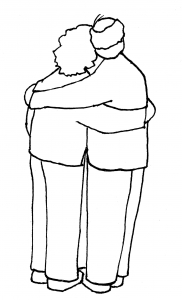Being a carer for my husband – Part 3

It was becoming more difficult as Bill’s needs increased
 I had to seek help as Bill’s needs had greatly increased. It is difficult to ask for help; the average person has no idea of what help is available, and the number of agencies involved. It is a maze which is difficult to negotiate, particularly when you have reached the stage of desperately needing help just to survive. Information is empowerment but a dozen or more pamphlets all needing to be read and understood – too much, too much!
I had to seek help as Bill’s needs had greatly increased. It is difficult to ask for help; the average person has no idea of what help is available, and the number of agencies involved. It is a maze which is difficult to negotiate, particularly when you have reached the stage of desperately needing help just to survive. Information is empowerment but a dozen or more pamphlets all needing to be read and understood – too much, too much!
It is humiliating to have to admit you can’t cope; it is embarrassing to let someone come into your home to do the floors and have them comment on the dust on your skirting boards! And, frankly, most of us don’t understand, or even care, where the funding is coming from, we just want help!
I think it would be wonderful if carers who are caring for someone with complex needs each had a case manager. Someone who would be the first person to sit down and talk to them about their needs and walk them through the maze, help them to understand what is available and assist with the access of services that will help to ease the load of caring. Someone who would help smooth out rough patches.
I did have someone to ‘smooth out rough patches’ but I didn’t often give her the chance to help me. Another problem, how do you help someone who resists help?
Respite makes a wonderful difference
By this time I was doing a lot of my volunteer work from home and would receive respite when I am away from Bill for more that a few hours.
I still feel guilty and worry that everything will be alright every time I leave home.
There is a grieving when you think of the things you had planned to do together which are no longer practical, or even possible. There is a grieving for the things you may have been able to achieve yourself but now can’t even try. There is great sadness when you think of lost opportunities; but there is great joy when you are still together in your own home and you are able to help make your partner’s life just a little more comfortable or enjoyable.
There are the misgivings, even fears, as you take on tasks that your partner had previously achieved so easily. There is a noise in the car engine – what is it? Is it serious? The gutters are loaded with leaves – could I manage to get the ladder from under the house and clear them? The fluorescent light in the kitchen isn’t working any more? Can I just buy replacement tubes? What did Bill say about a new starter? Who do I ask? Suddenly the house, garden and car maintenance are your responsibility.
A carer can’t share their problems with the person they are caring for; they just have to cope as best they can, smile and say ‘everything’s fine.’
Being a carer means that I had to be prepared to respond to Bill’s every need, it was immaterial if I was tired, busy, on the phone, ill or just in a bad mood. For most of our married life Bill would bring me a morning cup of tea into bed, I still miss that.
We felt fully supported by the Services that was supporting us and confident in their sincere concern for our well being. We received excellent care from the staff of various hospitals (I have to admit that I worried about the working environment within those hospitals but cannot fault the dedication and skill of the staff). They did the absolute maximum with what was available.
Carers need support from practitioners and medical staff
I know time is precious but please allocate sufficient time to talk through the problems that carers have, help them to understand the issues. Don’t rattle off medical terms, list numerous options and rush off to the next appointment. You may have seen this situation many times before – it is probably a first for us, and we are in a daze!
Carers need support and encouragement or they run the risk of frustration and despair becoming the dominating factors of their existence!
Help us so that we can experience that great joy of being together in your own home
Bill died in January 2007, exactly 13 years after his first stroke.
image: sraburton








 Proudly Australian owned and operated
Proudly Australian owned and operated